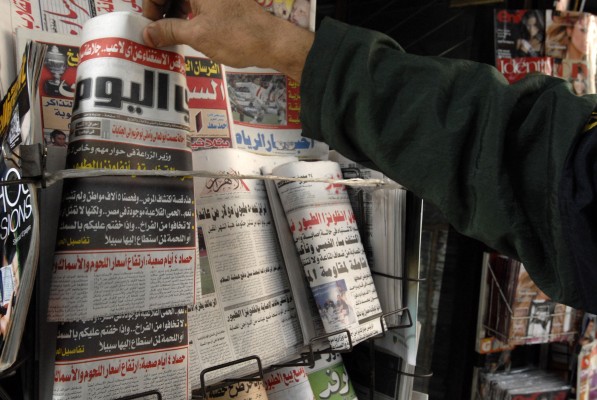The Press Crackdown in Egypt Hurts Everyone
February 26, 2014

Censorship is a dangerous thing. The Egyptian regime demonstrated the reason last month, when it charged 20 journalists with terrorism-related crimes, claiming they were conspiring with the now-banned Muslim Brotherhood. Of those charged, three Al Jazeera journalists have been detained since last December: Peter Greste, Mohamed Fahmy and Baher Mohamed. The accusation of both domestic and foreign journalists drew international attention to the crackdown on the press that is unfolding in Egypt. Such accusations affect not only Egyptians but also the greater international community, which counts on foreign correspondents to cover news outside of individual countries, fairly and openly. While it may be a tool for dictatorships to gain and maintain control, sooner or later, censorship never fails to backfire.
Other than the detained journalists themselves, the press crackdown directly affects the people of Egypt the most. In every country, the neutral coverage of national politics by outside news networks is a check on governments—especially authoritarian ones—which are not a reliable source for unbiased information by any means. Any governmental abuse of power or inhumane treatment of its citizens is unlikely to be exposed if a regime is controlling the flow of information. With a crackdown on freedom of press, there is also no longer a guarantee of transparency in the government and human rights. According to the Risk List of the Committee to Protect Journalists (CPJ), Egypt was ranked the third deadliest country for the press in 2013. This was a result of various tactics, from “the legal and physical intimidation during the tenure of former President Mohamed Morsi to the widespread censorship by the military-backed government that replaced him,” as explained in the CPJ’s 2013 annual report “Attacks on the Press”.
Censorship doesn’t benefit the Egyptian military government. Though it may appear to be an instant fix to the threat of opposing voices, a regime dependent on censorship is difficult to sustain, especially in this day and age, with the Internet making the regulation of information increasingly difficult. When reputable foreign journalists like Greste and Fahmy are punished for doing their job, the reputation and legitimacy of the regime come under international scrutiny. This was easily illustrated by the Feb. 4 protest in Nairobi, Kenya, in which approximately 100 journalists demanded the release of Greste and his two colleagues, with some protestors taping their mouths to symbolize censorship.
The reaction of the journalistic community indicates that censorship is dangerous for the international community as a whole because it undermines journalistic standards and practices. In a statement responding to the detention of journalists in Egypt, an Al Jazeera spokesperson said, “This is a challenge to free speech, to the right of journalists to report on all aspects of events, and to the right of people to know what is going on.” Indeed, journalists should have the right to work without being punished, and the people should have the right to be informed. Though the charges against journalists in Egypt are not directly based on censorship laws, it is clear that anti-terrorism laws are being misused to censor opposing views.
Egypt’s attack on foreign correspondents can be read as an attempt to discourage unbiased, proper journalism in Egypt, and these injustices have not gone unnoticed. Journalists around the world, and several organizations like Reporters Without Borders and Amnesty International have expressed their disapproval of the current situation for the media in Egypt, with many calling for the release of the detained journalists.
These intimidation tactics are detrimental to journalism; they are what make journalism such a necessary pursuit for the international community in the first place. The international community, especially journalists, must continue to put pressure on Egypt’s government because no matter what views are being suppressed, censorship hurts all.










Arafat • Mar 15, 2014 at 6:25 pm
Journalism has become a shallow profession. Journalistic research is now an oxymoron and selling the product is now the real goal. The above article is a testament to this sad truth.
Islam and free press, free speech cannot coexist despite this article’s assumption that they can.
Islam means submission (not peace as some Muslims would have us believe). It means submission to Allah and to all he stood for including repression of the individual – AND of individual freedoms. Implicit in a free press is questioning any and all and this is strictly forbidden in Islam, so the thought that Islam and a free press can coexist is a silly idea from the get-go.